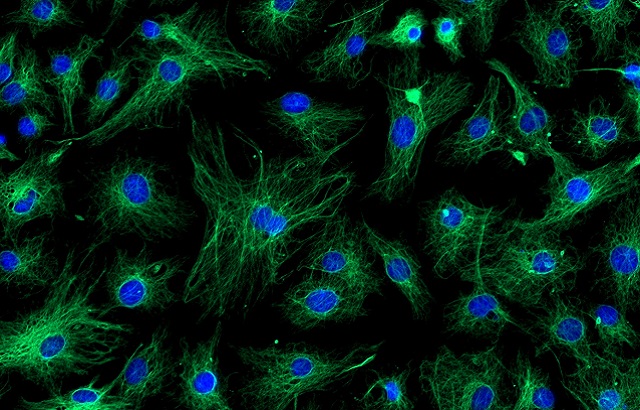

A drug that eliminates ‘zombie cells’ improves heart function after a heart attack according to new research, funded by the British Heart Foundation, which could pave the way for a new heart attack treatment.
 Researchers at Newcastle University found that after a heart attack senescent cells, also known as zombie cells, build up in the heart and prevent recovery.
Researchers at Newcastle University found that after a heart attack senescent cells, also known as zombie cells, build up in the heart and prevent recovery.
Zombie cells are not dead, but they don’t work as they should and can stop neighbouring cells working properly.
When researchers looked at the hearts of mice whose blood flow was restored after a heart attack, they found various types of heart cells became senescent, or ‘zombified’. These cells release molecules which increase the amount of inflammation and cause scar tissue to form in the heart muscle. As a result, the heart cannot pump normally.
During a heart attack the heart muscle becomes starved of blood and oxygen due to blockage of a coronary artery – the arteries leading to the heart. Life-saving treatment is often given to people to reopen the blocked artery and allow blood to flow back to the heart muscle. While early restoration of blood flow is essential to rescue the heart muscle, it can still cause significant damage.
Improved heart function
To see whether removing zombie cells once blood flow was restored could improve recovery of the heart muscle after a heart attack, the mice were given a drug known to kill zombie cells, called navitoclax, every day for a week. When researchers looked at the mouse hearts 5 weeks later, they found that the reduction in zombie cells with navitoclax improved recovery of the heart muscle. Inflammation was reduced, the scar tissue became smaller and there was an increase in the growth of blood vessels.
The team also looked at how well the mouse hearts were able to pump blood using an MRI scanner. Mice treated with navitoclax had significant improvements in their heart function and were able to pump blood around the body more effectively.
Hope for heart attack survivors
The Newcastle team, in collaboration with researchers at the Mayo Clinic in the US, Queen`s University Belfast and INSERM in France, now hope that this drug could be used within the next decade to help people recover from a heart attack.
Dr Gavin Richardson, lead author and Research Fellow at Newcastle University, said:
“We’ve discovered that removing these zombie cells can revitalise the heart after a heart attack. Our work reveals that drugs to kill zombie cells could be transformational in the treatment of heart diseases.
“We now need to test the long-term impact of killing these cells and to ensure the drug is safe to be tested in humans. We hope that this zombie cell-killing drug could be treating heart attack patients in the next 5-10 years.”
Professor Metin Avkiran, Associate Medical Director at the British Heart Foundation, said:
“In the UK, heart attacks account for more than 100,000 hospital admissions - that’s one every five minutes. Thanks to decades of research advances, at least seven out of 10 people now survive a heart attack. But the increased number of people surviving a heart attack means that more people are living with damaged hearts.
“The heart can’t mend itself so effective treatments to help restore normal heart function after a heart attack are desperately needed. It’s early days yet, but if further research goes on to show that they are safe and effective in people, drugs that target senescent cells could provide an entirely new way of treating heart attacks.”


